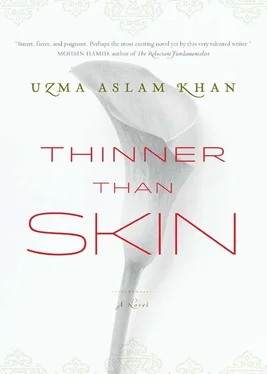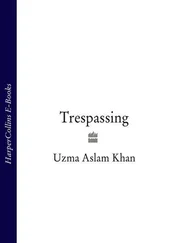Delicate negotiations, I thought. Years and years of delicate negotiations, to build a bedrock of trust. How easily it was spoiled.
An anger began to constrict my lungs.
There was a nagging thought, yes, I could only admit it now, walking back through the gray slush, our footprints ugly in the morning ice. I had no humor for snail-turd imagery, as on my way up. This fury inside me, it was far blacker and thicker than a snail or its turd. It nagged and nagged, though I tried to rub it off like a line of dirt, to tell myself it was only the movement of ice beneath my feet. And then it became a yellow-eyed fish, and I sat on that fish, I said to go down to the bottom of the lake and never again look up at the sun, or rise to the surface, for a sliver of air. But again it appeared, now a mean little fox, racing through the thickest sands of the shiftiest dunes, and I said to never disturb that sand, never kick up soft murky clouds, or shed a hair of that thick, furry tail.
Still my instructions went unheeded! This time it was a seagull, bobbing on a crest of a great, wide ocean, friendly and gay. Follow me! It said, with a flap of its wings. And it happened again, and again, till I had nowhere to hide.
The thought was this: Did Farhana jump in ?
She was already in the boat when Irfan pulled me up. Did he pull her up? I hadn’t had the chance to ask; I hadn’t had the nerve. He might say no, she was already in the boat. That proved nothing. She could have hauled herself up. She had the strength. She was also cold and shivering that day … but how cold? How shivering? Was she as drenched as I? I couldn’t remember. Knowing Irfan, that is hardly what he’d have noticed either. Wes? No. He wouldn’t have seen. I remembered him pacing the beach, muttering something in agitation; no one was thinking clearly.
Irfan might also say that she was a woman: she didn’t need to jump in. Just as she didn’t need to be included in the decision to come to Kaghan — it had been for her sake, that’s what mattered — she didn’t need to risk her life. Had she tried, she could never have made a difference.
But she was a stronger swimmer than me . And it was her idea. Her damn return! She’d been warned to leave the girl alone. Instead, her meddling had drowned us all.
But so what if she was a stronger swimmer ? Perhaps she didn’t feel strong enough that day. Perhaps it was foolish of me to dive. I could have died. No one wants to die.
I’d fallen behind Irfan on the glacier; I now caught up with him. I asked, my voice shaking, “You have some idea how deep the lake is, don’t you?”
He looked at me as though I’d walked into a mosque with slippers on.
“As deep as Lake Baikal,” he eventually growled, adding, “that’s in Russia.”
“How deep is that?”
“Over a mile.”
I waited, hoping he might add, There’s no way you could have found her . Instead, he checked his damn phone. His way of shooing me away.
Why hadn’t I seen Kiran when I dived? Had I waited too long? That horrible gurgling sound I heard in the water — how could I have heard it in the water? Where had I been? Where had Farhana been?
“In the weeks before coming here,” I said to Irfan, catching up with him again, “Farhana started to change her mind. It had been her idea, yet she grew afraid. You know, because of all the bombings and the kidnappings. I started telling you that, you know, before it happened.” I took a deep breath. “But by then, I was the one ready. She wanted me to call it off but I didn’t want to. She’d already made the proposal so she wouldn’t call it off herself. It was the same way she had doubts just before getting in the boat. Do you remember? It was her idea but then she grew afraid. Did you notice?”
The furrow between his brow sank like a chasm as he opened his mouth to speak. Then, changing his mind, he clamped his mouth shut. When the chasm lifted, he asked, “Did you notice the lake this morning?”
“Yes.”
“What did you see?”
“Calm surface. Clear sky. Malika Parbat’s twin peaks could have been etched in the water. As on that day.”
He nodded. “A lake so clear and bright, but hideous underneath. For months after Zulekha’s death — her murder” (I flinched at the word) “—this lake became a mirror of my own world. Then a voice started to tell me to look for a more hospitable truth. Not everything is as hideous as it doesn’t seem. If I believed in God, I’d say the voice was His. I think it was the lake’s.”
Back at the cabin, we took solitary walks. We cloaked ourselves in shades of green, drinking forest smells. Even at night, I sought my camera. My landscapes of the River Kunhar were cool-headed, as if I’d been the third person in our tent.
Green eyes, green as the leaves of walnut trees, newly shed in the river, before turning black. Green as her bangles, and their incessant chiming.
I never did call my mother from Irfan’s cell.
But I tried to take his advice. I devoted myself to reclothing us, Farhana and myself. I noticed she seemed to be doing the same. At night, we pecked each other quickly on the lips before lights out. When we met in daylight, she’d touch me on the thigh or on my back and the gesture was too deliberate, as if she were trying to recreate a lover she could touch. I’d do the same. I was glad when she followed Wes. She was glad when I followed Irfan. We created phantom foes — the lake, the jinn, the tourists — and phantom friends — each other, Wes, Irfan — but most of all, we created our own doubles. To these we assigned behavior, even roles.
I had dived repeatedly to look for Kiran. So had Farhana.
I had not given up. Neither had Farhana.
I had risked my own life. So had Farhana.
And the entire time, Irfan filled me in on the news. It was the only time he willingly talked to me. Apparently, there were real double agents in our midst, hunting real enemies. I couldn’t have cared less.
I came to think of “him”—this mysterious killer and his double, the accomplice (accomplice to what exactly — a killing in Karachi? So long ago, so far away!) — as some kind of lynx and his shadow. He’d crept down the slopes of Kashmir, kicking up flecks of powdery snow, his footfall a hushed load of velvet, leaping across the crevices of glaciers that might have been growing or receding, this was Pakistan after all, and to a lynx it was all the same. Or he might be a snow leopard from Uzbekistan, lurking low into the new millennium, no longer Soviet or Russian but Central Asian, looking for a skin for his spots. Or a yeti from Tajikistan, slipping into Pakistan from the west, sweeping down to Chitral on a very long tail, before twisting east through Swat and into Kaghan. Or perhaps I was looking in the wrong direction entirely. Perhaps he’d come up from the south, through desert sands that hid airfields for days, a snake mangled by a cluster bomb, a pheasant dropped by a falcon.
What was it Irfan had said, that day he first told me about him? That day . Yes. The killer’s link to this remote, peaceful valley was an accident of geography. And accidents can happen anywhere . I’d been watching Kiran in a magenta kameez walk up the hill to find her goat, Kola. Farhana had held her hand.
I took my camera to the closest town, the town of Naran. I learned that here he, the killer, was called Fareebi: the fraud, the shapeshifter. He was said to be hiding here to avoid suspicion, since all eyes were on the eastern border with Afghanistan. But Intelligence had tracked him — or was he tracking them?
At the store where I’d bought the Kashmiri shawl for Farhana, only five days ago, the shopkeeper unfolded a heap of shawls while a customer recited a local proverb. Nature instructs every creature to shapeshift in case of danger . Each shawl came in a dual pattern, with no clear front or back. The one I’d picked for Farhana had also been reversible. The customer rejected cloth after cloth, but he volunteered an opinion on the Karachi bombing. The death of seven Pakistanis and one Chinese man was revenge for the missile strikes in the killer’s village.
Читать дальше












